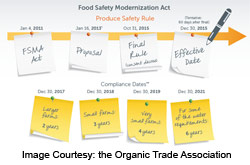Creating Transparency and Trust in Global Food Chains
By John Keogh
The concepts of transparency and trust present a formidable paradox in that scholars have difficulty in agreeing which comes first. A recent literature review uncovered a lot of unanswered questions: is transparency an antecedent of trust or vice versa? Does transparency mediate consumer trust? Is trust required to build trust? Transparency for whom, when and why? Does a desire for information, or possession of information imply a necessity to disclose? It’s a complicated issue and scholars also note that while rules, laws, regulations, best practices, and technologies, etc., aid in transparency, they all depend heavily on people with integrity doing the right thing.
Non-Negotiable and Non-Competitive
They all depend heavily on people with integrity doing the right thing.
There is a shared view between scholars and industry that food safety should be both non-negotiable and non-competitive. However, consumers’ perception of food safety risk has increased amid broader concerns for their overall health and well-being. This is driven by the near constant exposure to global news, social media chatter or public safety alerts about unsafe, counterfeit or adulterated food. And it’s compounded by the fact that consumers are exposed to conflicting scientific research and reports about the health risks or health benefits of certain foods. As a result, information asymmetries are created with consumers and their ability to interpret scientific findings and public health advisories or warnings. An example of the information asymmetries facing consumers occurred on October 26th, 2015, when the World Health Organization’s (WHO) International Agency for Research on Cancer (IARC) announced that after reviewing 800 scientific reports, they had determined that processed meat causes cancer (Bouvard et al., 2015).
After receiving many queries and expressions of concern from industry scientists, the WHO relented and issued a clarifying statement on October 29th 2015 advising consumers to reduce, rather than stop, consumption. Transparency on the health risks associated with food consumption is a critical aspect of public health policy. However, this public debate and apparent backtracking leaves consumers wondering who, and what information, to trust.
Traceability Issues
Health conscious consumers are increasingly interested in the traceability and origins of food products and the transparency of ingredients, including food additives, preservatives or colorants. Some consumer segments worry about the verification of lifestyle or faith-based methods of production and preparation (e.g. kosher, halal, vegan, jain). Concerns extend to whether pesticides, herbicides or insecticides were used, and if harmful residue remains on the product. Fueled by activist groups and social media, there is growing interest in sustainability and ethical sourcing issues, as well as greater awareness of human slavery and animal cruelty. Providing relevant transparency information that consumers can trust poses significant management issues. The first of these is that global food supply chains are complex, multi-lingual and multi-cultural with varying levels of competent regulatory frameworks, food safety enforcement processes and ethical practices. Managing this complexity and inherent risk while ensuring compliance to import regulations, and meeting consumer expectations for transparency, is a formidable management challenge.
Agency Theory
Scholars highlight the relevance of agency theory in managing this complexity. Agency theory plays out when the interests of the hiring principal (i.e. the manufacturer) and their agent (i.e. the supplier) diverge over time, adding to costs and potential conflict through opportunistic behavior on the part of the agent. This also leads to information asymmetries (between the principal and the agent) with an estimated societal cost burden that could rise to five percent of revenues. Enhancing transparency can increase the principal’s control over the agent and can be aided by strict contractual guidelines, agent training, alignment on ethical principles and proactive monitoring mechanisms.
Enhancing supply chain transparency is vital as food brands are under constant public scrutiny. Poorly designed contracts and agent monitoring mechanisms could impact brand reputation and business performance as whistleblowers, social activists, governments and third party agencies expose ethical lapses, criminal wrongdoings or regulatory compliance failures. The exposed issues can include bribery, slavery, animal cruelty, food safety, food fraud, economically motivated adulteration, false claims (origin, non-GMO, organic, sustainable), and mislabelling, including undeclared ingredients and allergens etc.
Cancellation of Contracts
In a recent case, Greenpeace provided evidence of palm oil sustainability breeches and rainforest destruction that led to global food companies being forced to cancel contracts with a supplier. The monitoring of agents is a key strategy to enhance transparency and mitigate the principal’s risk of agency costs and reputation damage, which of course relates to consumer trust. The monitoring of agents can be done either proactively with unannounced visits and audits, fire drills (such as recall practice) or reactively after the alarm has been set off by third parties. As we can see in the Greenpeace case, without direct or indirect monitoring mechanisms, the agent may conceal their activities, provide false information or hide negative information which may directly affect the business and reputational outcomes for the principal. In conclusion, whether or not transparency or trust comes first may be secondary to ensuring mechanisms are in place to proactively monitor supply agents ensuring that ethical values are embraced and people/agents are doing the right thing.
About the Author
John Keogh is Founder and Managing Principal at supply chain advisory firm Shantalla Inc. and he serves as one of GFSR’s trusted industry advisors. A former Senior Vice President at GS1 Canada and adviser to GS1 Global Office, John specializes in supply chain management, particularly in critical areas such as traceability, recall and anti-counterfeit measures. He is a sought-after speaker and panelist, and currently liaises with and provides advice to the EU Health and Consumers Directorate General (DG SANCO); the Organisation for Economic Co-operation and Development’s Committee on Consumer Policy; the World Customs Organization anti-counterfeiting initiative; the Asia-Pacific Economic Cooperation (APEC) sub-fora on food safety, food security and global data standards; the Association of Southeast Asian Nations (ASEAN) sub-fora on consumer safety; and the World Bank’sGlobal Food Safety Partnership technical committee.

-
 FeaturedRisk management
The Cost of a Breach: What a Cyberattack Could Mean for Food Safety Recalls
FeaturedRisk management
The Cost of a Breach: What a Cyberattack Could Mean for Food Safety Recalls
-
 FeaturedRisk management
Securing the Food Chain: How ISO/IEC 27001 Strengthens Cybersecurity
FeaturedRisk management
Securing the Food Chain: How ISO/IEC 27001 Strengthens Cybersecurity
-
 FeaturedRisk management
Revolutionizing Food Safety Training: Breaking Out of the “Check-the-Box” Mentality
FeaturedRisk management
Revolutionizing Food Safety Training: Breaking Out of the “Check-the-Box” Mentality
-
 GFSI Standards
GFSI 2025: Building Trust, Tech-Forward Solutions, and Global Unity in Food Safety
GFSI Standards
GFSI 2025: Building Trust, Tech-Forward Solutions, and Global Unity in Food Safety
-
 FeaturedFood Safety
Integrated Pest Management: Strategies to Protect Your Brand’s Reputation
FeaturedFood Safety
Integrated Pest Management: Strategies to Protect Your Brand’s Reputation
-
 FeaturedFood Safety Culture & Training
No Open Door Policy: Challenges That Impact Pest Control in Food Processing Plants
FeaturedFood Safety Culture & Training
No Open Door Policy: Challenges That Impact Pest Control in Food Processing Plants




